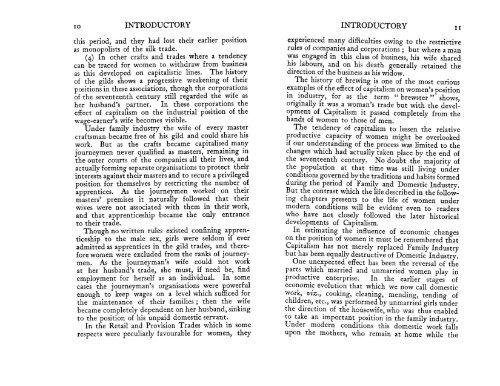working life of women seventeenth century - School of Economics ...
working life of women seventeenth century - School of Economics ...
working life of women seventeenth century - School of Economics ...
You also want an ePaper? Increase the reach of your titles
YUMPU automatically turns print PDFs into web optimized ePapers that Google loves.
10 INTRODUCTORY INTRODUCTORYthis period, and they had lost their earlier positionas monopolists <strong>of</strong> the silk trade.(4) In other crafts and trades where a tendencycan be traced for <strong>women</strong> to withdraw from businessas this developed on capitalistic lines. The history<strong>of</strong> the gilds shows a progressive weakening <strong>of</strong> theirpositions in these associations, though the corporations<strong>of</strong> the <strong>seventeenth</strong> <strong>century</strong> still regarded the wife asher husband's partner. In these corporations theeffect <strong>of</strong> capitalism on the industrial position <strong>of</strong> thewage-earner's wife becomes visible.Under family industry the wife <strong>of</strong> every mastercraftsman became free <strong>of</strong> his gild and could share hiswork. But as the crafts became capitalised manyjourneymen never qualified as masters, remaining inthe outer courts <strong>of</strong> the companies all their lives, andactually forming separate organisations to protect theirinterests against their masters and to secure a privilegedposition for themselves by restricting the number <strong>of</strong>apprentices. As the journeymen worked on theirmasters' premises it naturally followed that theirwives were not associated with them in their work,and that apprenticeship became the only entranceto their trade.Though no written rules existed confining apprenticeshipto the male sex, girls were seldom if everadmitted as apprentices in the gild trades, and therefore<strong>women</strong> were excluded from the ranks <strong>of</strong> journeymen.As the journeyman's wife could not workat her husband's trade, she must, if need be, findemployment for herself as an individual. In somecases the journeyman's organisations were powerfulenough to keep wages on a level which sufficed forthe maintenance <strong>of</strong> their families ; then the wifebecame completely dependent on her husband, sinkingto the position <strong>of</strong> his unpaid domestic servant.In the Retail and Provision Trades which in somerespects were peculiarly favourable for <strong>women</strong>, theyexperienced many difficulties owing to the restrictiverules <strong>of</strong> companies and corporations ; but where a manwas engaged in this class <strong>of</strong> business, his wife sharedhis labours, and on his death generally retained thedirection <strong>of</strong> the business as his widow.The history <strong>of</strong> brewing is one <strong>of</strong> the most curiousexamples <strong>of</strong> the effect <strong>of</strong> capitalism on <strong>women</strong>'s positionin industry, for as the term " brewster " shows,originally it was a woman's trade but with the development<strong>of</strong> Capitalism it passed completely from thehands <strong>of</strong> <strong>women</strong> to those <strong>of</strong> men.The tendency <strong>of</strong> capitalism to lessen the relativeproductive capacity <strong>of</strong> <strong>women</strong> might be overlookedif our understanding <strong>of</strong> the process was limited to thechanges which had actually taken place by the end <strong>of</strong>the <strong>seventeenth</strong> <strong>century</strong>. No doubt the majority <strong>of</strong>the population at that time was still living underconditions governed by the traditions and habits formedduring the period <strong>of</strong> Family and Domestic Industry.But the contrast which the <strong>life</strong> described in the followingchapters presents to the <strong>life</strong> <strong>of</strong> <strong>women</strong> undermodern conditions will be evident even to readerswho have not closely followed the later historicaldevelopments <strong>of</strong> Capitalism.In estimating the influence <strong>of</strong> economic changeson the position <strong>of</strong> <strong>women</strong> it must be remembered thatCapitalism has not merely replaced Family Industrybut has been equally destructive <strong>of</strong> Domestic Industry.One unexpected effect has been the reversal <strong>of</strong> theparts which married and unmarried <strong>women</strong> play inproductive enterprise. In the earlier stages <strong>of</strong>economic evolution that which we now call domesticwork, viz., cooking, cleaning, mending, tending <strong>of</strong>children, etc., was performed by unmarried girls underthe direction <strong>of</strong> the housewife, who was thus enabledto take an important position in the family industry.Under modern conditions this domestic work fallsupon the mothers, who remain at home while the
















